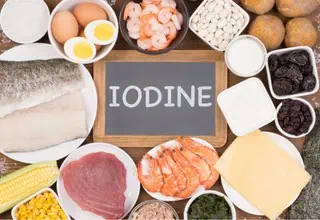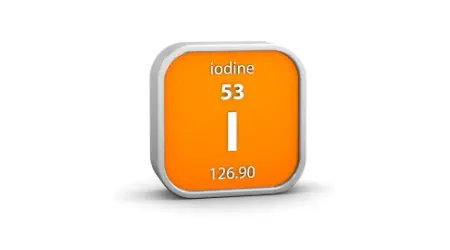
Iodine has beneficial anti-estrogenic effects that can relieve breast pain, ovulation pain, and premenstrual mood symptoms. It may also help prevent ovarian cysts by promoting healthy estrogen metabolism, down-regulating estrogen receptors, and stabilizing estrogen-sensitive tissue.
That makes iodine one of the best treatments for estrogen excess or so-called “estrogen dominance”—although I don’t use that term.
Iodine for women’s health
Iodine can be an effective nutritional strategy for the following women’s health conditions:
- fibrocystic breasts, breast cysts, and pain
- ovulation pain
- prevention of ovarian cysts
- irregular periods, including some types of PCOS
- prevention of fibroids
- heavy periods
- perimenopause
- endometriosis
- premenstrual mood symptoms, including PMS and PMDD.
💡Tip: Iodine improves endometriosis because it’s anti-estrogenic, antimicrobial, and immune-modulating.
💡Tip: Other treatments for premenstrual mood symptoms include a dairy-free, histamine-reducing diet, magnesium, vitamin B6, and progesterone.

Iodine supports metabolic health
According to a 2024 research review, iodine also supports metabolic health and weight regulation by reducing inflammation, improving insulin sensitivity, modulating the microbiome, and protecting against oxidative stress.
Don’t take iodine without testing thyroid antibodies
Before trying iodine, ask your doctor to test for thyroid antibodies (anti-TPO or anti-thyroglobulin antibodies).
- If your test is positive, do not take more than 0.3 mg (300 mcg) of iodine—especially potassium iodide—as it can aggravate or trigger autoimmune thyroid disease (e.g., Hashimoto’s).
- If you develop abnormal thyroid function while taking iodine, stop immediately and consult your doctor.
💡Tip: A positive thyroid antibody result means higher-dose iodine is not safe to try.
If your thyroid antibody test is negative, you could consider a higher dose of 1000 to 3000 mcg of iodine, preferably as molecular iodine (I₂), which is less likely to affect the thyroid than potassium iodide.
💡Tip: Read the label because some iodine supplements contain way more than 3 mg (3000 mcg).
Selenium can help protect the thyroid while using iodine. (For example, the brand Violet Daily contains molecular iodine plus selenium.)
💡Tip: Higher-dose iodine is not safe during pregnancy or breastfeeding.
When is iodine the right treatment?
Signs that iodine might help include:
- Breast pain or tenderness, which suggests iodine deficiency.
- A plant-based or vegan diet, which is low in iodine.
Food sources of iodine
- Seafood: 10–190 mcg per 100 g
- Egg yolks: 24 mcg per yolk
- Butter (from grass-fed cows in iodine-rich soils)
- Iodized salt: ~400 mcg per tsp
- Leafy greens and mushrooms (only if grown in iodine-rich soil)
- Seaweed/kelp: 2–800 mcg per 100 g*
*Note: Kelp also contains bromine, which can block iodine uptake.
Ask me in the comments.
